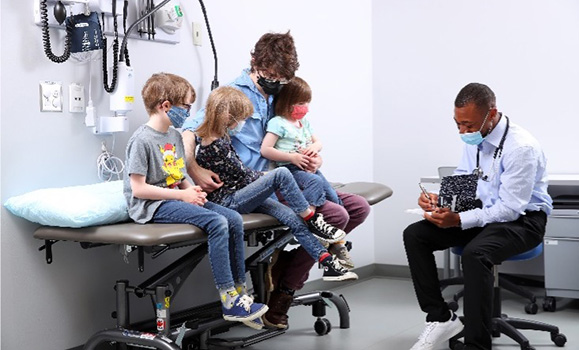When Shaylor Austin and their children, Sagey and Ruari, arrived last month to see a doctor about Sagey‚Äôs nagging cold, it wasn‚Äôt your typical appointment. They entered an exam room at the Centre for Collaborative Clinical Learning and Research (C3LR) at ∫⁄¡œ≥‘πœÕ¯and were greeted by two second-year medical students and a supervising pediatrician. The nagging cold is part of a script provided to Austin in advance of the session, and, in fact, Sagey doesn‚Äôt have a cold at all.Ã˝
The Austins are part of a group of approximately 25-50 families who participate in the Parent Tot program at ∫⁄¡œ≥‘πœÕ¯each year. One of the many programs developed and implemented by the C3LR in collaboration with the Faculties of Medicine and Health, the Parent Tot program provides learners with the opportunity to develop and practice critical pediatric skills by working with real children ‚Äî adding authenticity to simulated experiences and interactions learners may face in clinical practice.
Developed more than 15 years ago, the Parent Tot program sees medical students in their second year of training and both nursing and audiology and speech-language pathology students in their first year of training complete mandatory appointment-style sessions with a parent or guardian and their child in a simulated clinical setting. As the only pediatric training in medical school before entering clerkship, the goal is for learners to increase their comfort level working with children and parents/guardians.Ã˝
Kids will be kids
Medical students in the program are guided and supported by a pediatrician through each session. Prior to the arrival of the child and parent/guardian, the student and pediatrician discuss expectations and objectives as well as any questions or concerns the student may have. The tutor pediatricians know to prepare the students to expect the unexpected. Kids will be kids.Ã˝¬Ý
Once the child and parent/guardian enter the room, it becomes less like a simulated situation and more like a real appointment, with children who are typically too young to follow the brief script provided to their parent/guardian.
Emily Armstrong is a Simulated Patient Educator at the C3LR and alongside her colleague Christine Daniels has been coordinating the program since 2014.Ã˝
“This program falls somewhere between our simulated patient program and our volunteer patient program because we can somewhat simulate the parents/guardians, although they're coming with a lot of their own volunteered information and history, but children are coming just as themselves,” says Emily. “We don't dictate what happens and that's where we prep the learners.”

Unmatched real-world experience
Dominique Salh, who is soon entering her third year of medical school, participated in the Parent Tot program during the 2021-2022 academic year and says learning to provide patient-centred care for children is a skill that would be much more difficult to develop with a mannequin.
“Children have busy minds, are energetic, and require our full attention to keep them engaged during a clinical exam,” she says. “For example, there is a difference between listening to the heart sounds of a manniquen, versus listening to the heart sounds of a tot who likes to wiggle around in their parent's arms or on the exam table.”
Dominique and her fellow medical students faced the additional challenge of completing part of the program virtually, as COVID-19 disrupted regular in-person sessions. Despite this, students were able to fulfill all the program requirements and gain significant virtual-care experience. Students who missed in-person sessions were invited back in April to complete physical exams with parents and children, an experience that Dominique is grateful for.Ã˝
“It is a great privilege to work with children from our local community. The Parent Tot program exposes medical students to a diverse range of children and their families, reflective of the population we will be working with as medical clerks in our third and fourth years of medical school.”
Related reading: Department of Family Medicine set to offer comprehensive Indigenous health education
Recruiting Dal’s youngest employees
The Parent Tot program has a database of approximately 100 families with children in the zero-five age-range. This number is always changing, with children graduating out of the pediatric program, making recruitment ongoing. Considered some of Dalhousie‚Äôs youngest employees, the families of the children involved receive $20 per hour for sessions that range from one to three hours, with a minimum payment of two hours.Ã˝
Shaylor and their family got involved in the program in 2015 after hearing about it through a local Parents of Multiples group. The Austins, who have four children, including eight-year-old twins, Peregrine and Larkin, six-year-old Sagey, and three-year-old Ruari, have been involved in an incredible 78 Faculty of Medicine-specific sessions, which is equal to approximately 200 individual interactions and a little over 400 medical student encounters. This doesn‚Äôt include their sessions with the Faculty of Health.Ã˝¬Ý
“When we started, it really felt like an incredibly important and valuable thing to do,” says Shaylor. “As parents we can recognize how hard it can be to interact with kids without experience. When you add the complications that arise in a medical environment it’s something you really want to prepare people for as much as possible and so we’re happy to help with that however we can.”
The program has also benefitted the children by helping them to become familiar and comfortable in medical settings, easing the stress of their own appointments. Encouraged by the experience, one of the Austin twins, Peregrine, is even aspiring to become a doctor.Ã˝
“It’s been an overwhelmingly positive experience for us,” says Shaylor. “It’s great knowing that we’re giving potential new doctors a valuable learning experience that may help them be better when dealing with kids in the future.”
If you are a parent or guardian interested in participating, contact the Parent Tot program at ptot@dal.ca for more information. For those in New Brunswick interested in getting involved, contact dmnblrc@dal.ca.Ã˝

